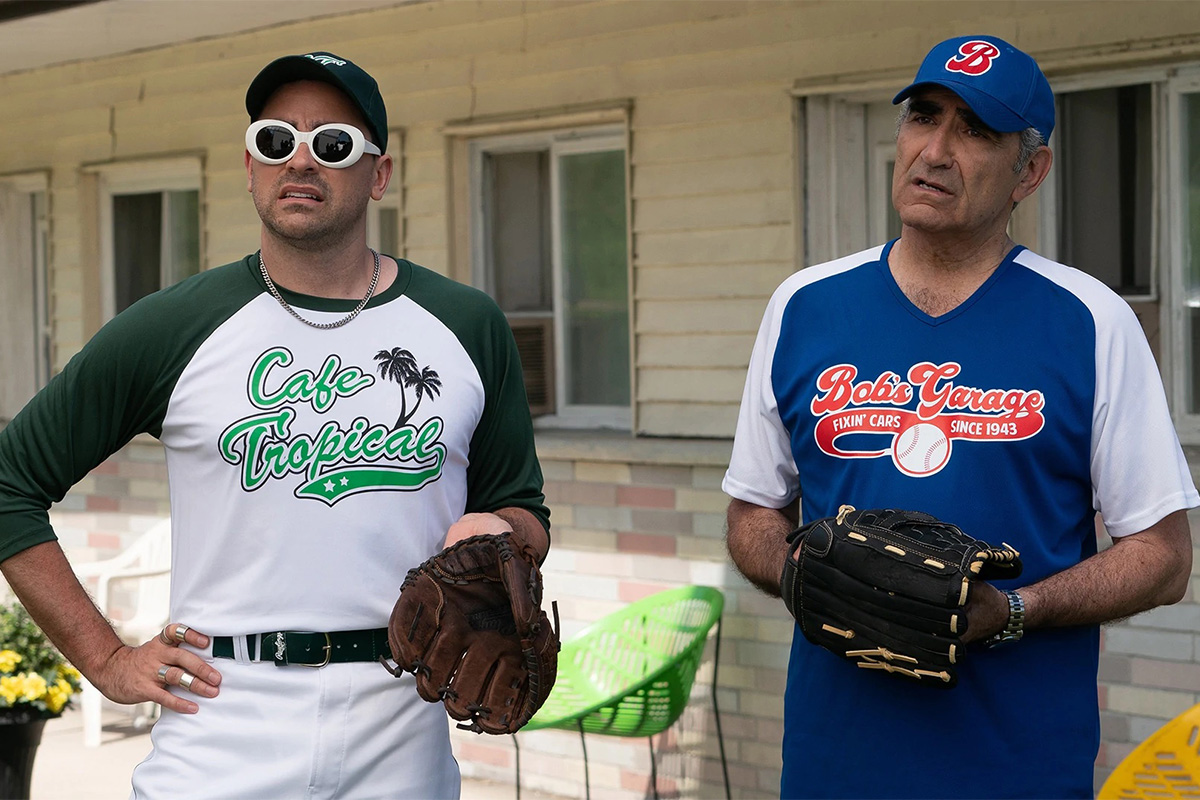This essay contains some spoilers for “Schitt’s Creek,” but if you’re reading this, you’ve probably already watched the series (at least once!).
Though the final episode of “Schitt’s Creek” aired in April 2020, the heartwarming Canadian show continues to resonate with viewers, especially those who stream it over and over on Netflix (like me). The deep character work that comes from comedy legends Eugene Levy and Catherine O’Hara and the thoughtful writing of Eugene’s son Dan Levy offer audiences characters who are both archetypal and who defy stereotypes in this feel-good show. While many television series still traffic in overt or covert antisemitic stereotypes, this show reminds us of the power of representation and complexity for Jewish characters.
Both Johnny Rose and David Rose embody Jewish men who are recognizable while stretching stereotypes in humanized ways. The nebbish character, an impotent, neurotic male as a foil to the Jewish American Princess and Jewish mother stereotypes, emerged out of Jewish insecurities and a warped performance of patriarchy. Annie Murphy’s Alexis Rose has been hailed as a “more extra, Canadian version of a Jewish American Princess,” and her father and brother also give their own version of a gendered and cultural trope through the nebbish.
In the post-World War II United States, non-Jews placed particular expectations onto Jewish bodies, and Jewish women and men placed particular expectations on one another. Anxieties about the family, class and economy were projected onto Jewish women by Jewish men, non-Jews, and were also internalized by Jewish women. These stereotypes often place men and women in conflict with one another, a tense distrust articulated in romantic situations and media representations. Think Rick Moranis as Seymour in “Little Shop of Horrors,” Jason Alexander as George Costanza in “Seinfeld” or Dustin Hoffman as Benjamin Braddock in “The Graduate,” whose characters were never outright defined as Jewish but were certainly played and read as such.
The Rose men take the nebbish and spin it on its head, as they step into sexual desirability built not on hypermasculinity but on finesse, attention to detail and self-assurance. While the nebbish experiences male privilege, it does not embody normative masculinity, but rather a deviant and pathologized masculinity.
As a pansexual “trend forecaster,” David Rose is a character who traditionally might not find love and be relegated to sexual punchlines. However, that is not his arc. Even before his long-term relationship and marriage to devoted Patrick (Noah Reid), he still has casual hookups and relationships where he is always seen as sexually empowered. David is not deviant, and though he has experienced trauma in relationships, he is not marked by pathology. Show creator and actor Dan Levy talks about the importance of “healthy LGBTQ representation,” and he also portrays a healthy Jewish masculinity through David Rose.
As the Rose father (I’m intentionally not using the term “patriarch,” as it is laden and not the way that he embodies power), Johnny Rose is sometimes the butt of jokes for his long-winded stories about business. He is also a tender and affectionate parent, mentor, husband and community member. He is romantic, self-assured as a lover, even referring to himself in contrast to Roland (Chris Elliott) as “steak,” not a burger. Even in his frugality as a business owner, he swerves past the fulfillment of a miserly or money-hungry Jewish caricature. His experience, along with his collaboration with Stevie (Emily Hampshire) and Roland, grows the Rosebud Motel. When, at the Mayor’s Roast in season five, Ronnie says, “I’m handing it off to the one who wears the pants in the Rose family – but Moira’s not here right now,” the joke hits a tapestry of a man instead of a caricature. And when he does take the mic, he holds his own.
A fantastic episode where these characters’ portrayals of complex masculinity collide is “The M.V.P.,” in season five. In it, both David and Johnny sub in for the recreational baseball game, on opposing teams. David swallows his misgivings about team sports and uniforms to support his boyfriend and to get VIP access to the barbecue. Johnny eagerly joins to relive his glory days on his Hebrew school’s team, The Flying Latkes. Though others’ expectations of them are tentative and low, Johnny is excited and supportive of David, who hits an unexpected home run. Surprise athleticism! Yes, he also gets hit in the back by a ball, but he is not without some triumph.
The characters of “Schitt’s Creek” display growth, messiness and three dimensions of humanity throughout their six seasons. Johnny and David show audiences different types of Jewish men; men who are tender, self-assured, sexually desirable and community leaders. The agency to subvert these stereotypes and play to a deeper truth makes us all more empowered. Representation itself does not eliminate oppression. However, when we are able to see multiple types of Jewish manhood, we are able to imagine more complex and whole futures for ourselves.
Late Take is a series on Alma where we revisit Jewish pop culture of the past for no reason, other than the fact that we can’t stop thinking about it?? If you have a pitch for this column, please e-mail submissions@heyalma.com with “Late Take” in the subject line.




